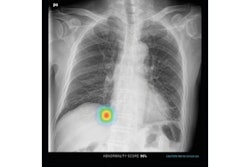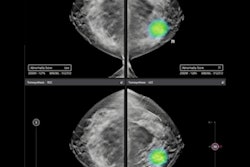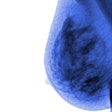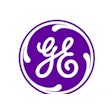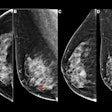
Lunit is claiming that its artificial intelligence (AI) algorithm showed great accuracy when identifying breast cancer in recent studies published in JAMA Oncology and Lancet Digital Health.
The pair of studies conducted by Dr. Fredrik Strand, PhD, from the Karolinska Institute and his research team featured performance results of Lunit Insight MMG, a commercial AI solution for breast cancer detection from mammograms.
The company said its algorithm showed the best accuracy in the JAMA Oncology study, based on 8,805 breast cancer cases, with sensitivity around 15 percentage points higher than the sensitivity of the other two algorithms. It's sensitivity also surpassed that of the first-reader radiologists, and it achieved a synergistic sensitivity of 88.6% in the combination of first readers and Lunit's AI algorithm.
In the Lancet Digital Health study, Lunit Insight MMG rarely missed any cancers in the majority of mammograms receiving a low abnormality score when assessing data with no radiologists involved. If no radiologist resources were used for 60% of women with the lowest AI scores and were invested in MRI for the top 2% of AI scores, a net 103 of 547 cancers would potentially have been detected up to two years earlier. This corresponds to a detection rate of 68 cancers per 1,000 supplemental screening examinations, according to the company.





